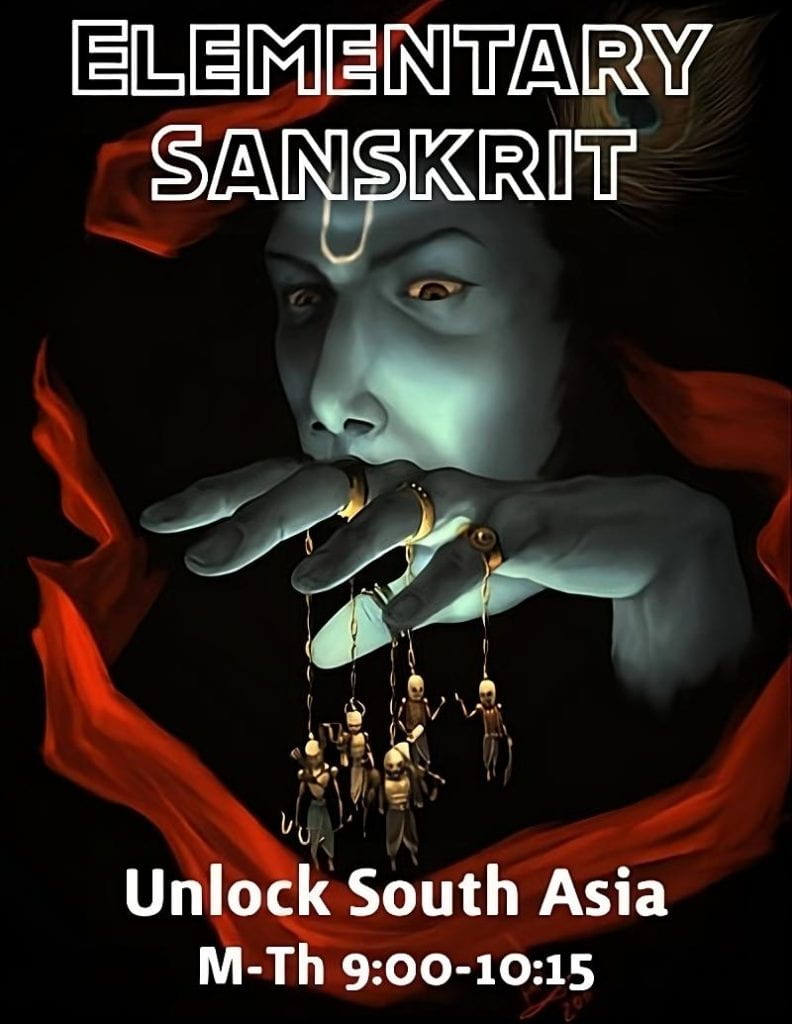
Classical Sanskrit is the transcultural, transregional language par excellence for the civilizations that have flourished in South Asia. For its beauty and complexity, it has been called “the language of the gods.” For nearly three millennia, South Asian seers and sovereigns, poets and philosophers, scholars and scientists composed texts of astonishing literary beauty and incredible logical rigor in Sanskrit. Indeed, to be a South Asian intellectual was to be a master of Sanskrit—not merely to be fluent in it, but to understand the rigorous linguistic underpinnings of the language (its morphology, syntax, and prosody) as well as to absorb the complex theories of aesthetics and hermeneutics that govern Sanskrit texts. The study of Sanskrit is therefore absolutely essential for unlocking the profundities and the complexities of the life of the mind and of the heart in classical South Asia. It offers many lifetimes’ worth of insight into worlds of literature, linguistics, law, ritual, and philosophy—all the more so, since millions of precious manuscripts remain unstudied and untranslated in the original Sanskrit. Studying Sanskrit also provides a powerful foundation for studying the modern South Asian languages, most of which bear the deep imprint of the language of the gods. It is thus the key not just to South Asia’s past, but also to its present and to its future.
Fall
Sanskrit 101A Elementary Sanskrit
Instructor: Patrick Cummins; M-Th, 9:00-10:15am
Sanskrit. It’s easier than you think! Unlock the depth and beauty of South Asia in only two semesters. By the end of the academic year, students will be ready to read texts like the Mahābhārata and Bhagavad Gītā with the aid of only a dictionary. In this course, students will gain mastery of the foundations of the Sanskrit language: the Devanāgarī writing system, correct pronunciation, all fundamental topics of grammar, basic writing and speaking.
No auditors are permitted. Enrolled students must take the course for a letter grade.
Sanskrit 102BR Intermediate Sanskrit
Instructor: Parimal Patil/Jungu Seo ; M/W/F, 12:00-1:15pm
The intermediate-level course introduces students to epic Sanskrit, simple poetry and literary commentary. In the fall, students read from one of the two great Sanskrit epics, the Mahābhārata or the Rāmāyaṇa. In the first half of the spring term, students study a work of poetry (kāvya) that portrays the same story. In the second half of the spring term, students read select portions of a Sanskrit commentary on that poetic composition.
New skills will be introduced such as the analysis and pronunciation of Sanskrit meters. The “Related Section” for this course will be a weekly review session led by the Teaching Fellow.
No auditors will be permitted. Enrolled students must take the course for a letter grade.
Sanskrit 200AR Advanced Philosophical Sanskrit
Instructor: Patrick Cummins; T/Th, 10:30am-12:30pm
In this course we read Sanskrit treatises which were at the heart of Sanskrit philosophy. Materials covered in this regularly offered course include: ontology, the epistemology of perception, inference, philosophy of mind, philosophy of language, philosophy of action. In Spring 2023 we read from Dignāga’s seminal treatise on mind-only Buddhism, the Pramāṇasamuccaya, together with Jinendrabuddhi’s commentary thereupon, the Viśālāmalavatī. In Fall 2024, we will read Brahmanical (Nyāya and Mīmāṃsā) responses to Dignāga.
Spring
Sanskrit 101B Elementary Sanskrit
Instructor: Patrick Cummins; M-Th, 9:00-10:15am
Sanskrit. It’s easier than you think! Unlock the depth and beauty of South Asia in only two semesters. By the end of the academic year, students will be ready to read texts like the Mahābhārata and Bhagavad Gītā with the aid of only a dictionary. In this course, students will gain mastery of the foundations of the Sanskrit language: the Devanāgarī writing system, correct pronunciation, all fundamental topics of grammar, basic writing and speaking.
No auditors are permitted. Enrolled students must take the course for a letter grade.
Sanskrit 102BR Intermediate Sanskrit
Instructor: Parimal Patil/Jungu Seo ; M/W/F, 12:00-1:15pm
The intermediate-level course introduces students to epic Sanskrit, simple poetry and literary commentary. In the fall, students read from one of the two great Sanskrit epics, the Mahābhārata or the Rāmāyaṇa. In the first half of the spring term, students study a work of poetry (kāvya) that portrays the same story. In the second half of the spring term, students read select portions of a Sanskrit commentary on that poetic composition.
New skills will be introduced such as the analysis and pronunciation of Sanskrit meters. The “Related Section” for this course will be a weekly review session led by the Teaching Fellow.
No auditors will be permitted. Enrolled students must take the course for a letter grade.
Sanskrit 201AR Advanced Literary Sanskrit
Instructor: Patrick Cummins; T/Th, 10:30am-12:30pm (Spring)
An advanced Sanskrit reading course focused on classical belles lettres (kāvya) and, occasionally, accompanying scholastic commentary and its adjacent knowledge fields (poetics, grammar, etc.). Materials covered in this regularly offered course range from poetry inspired by the Sanskrit epics (e.g., Bhāravi’s Kirātārjunīya and Māgha’s Śiśupālavadha) to patron-centered poems (e.g., Bilhaṇa’s Vikramāṅkadevacarita and Gaṅgādevī’s Madhurāvijaya) to religio-philosophical poetry (Buddhist, Jain, Śaiva, Vaiṣṇava).
